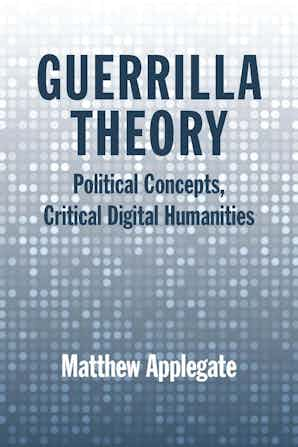Guerrilla theory: Political Concepts, Critical Digital Humanities
 Guerrilla Theory examines the political, ontological, and technological underpinnings of the guerrilla in the digital humanities (DH). The figure of the guerrilla appears in digital humanities’ recent history as an agent of tactical reformation. It refers to a broad swath of disciplinary desires: digital humanities’ claim to collaborative and inclusive pedagogy, minimal and encrypted computing, and a host of minoritarian political interventions in its praxis, including queer politics, critical race studies, and feminist theory.
Guerrilla Theory examines the political, ontological, and technological underpinnings of the guerrilla in the digital humanities (DH). The figure of the guerrilla appears in digital humanities’ recent history as an agent of tactical reformation. It refers to a broad swath of disciplinary desires: digital humanities’ claim to collaborative and inclusive pedagogy, minimal and encrypted computing, and a host of minoritarian political interventions in its praxis, including queer politics, critical race studies, and feminist theory.
In this penetrating study, Matthew Applegate uses the guerrilla to connect popular iterations of digital humanities’ practice to its political rhetoric and infrastructure. By doing so, he reorients DH’s conceptual lexicon around practices of collective becoming, mediated by claims to conflict, antagonism, and democratic will.
Applegate traces Michael Hardt and Antonio Negri’s radical democratic ingresses into network theory, the guerrilla’s role in its discourse, and concerns for the digital humanities’ own invocation of the figure. The book also connects post- and decolonial, feminist, and Marxist iterations of DH praxis to the aesthetic histories of movements such as Latin American Third Cinema and the documentary cinema of the Black Panther Party. Concluding with a meditation on contemporary political modalities inherent in DH’s disciplinary expansion, Guerrilla Theory challenges the current political scope of the digital humanities and thus its future institutional impact.
zum Buch im ULB-Katalog
zum Buch auf der Verlags-Website
Language and text. Data, models, information and applications
 Specialists in quantitative linguistics the world over have recourse to a solid and universal methodology. These days, their methods and mathematical models must also respond to new communication phenomena and the flood of data produced daily. While various disciplines (computer science, media science) have different ways of processing this onslaught of information, the linguistic approach is arguably the most relevant and effective. This book includes recent results from many renowned contemporary practitioners in the field. Our target audiences are academics, researchers, graduate students, and others involved in linguistics, digital humanities, and applied mathematics.
Specialists in quantitative linguistics the world over have recourse to a solid and universal methodology. These days, their methods and mathematical models must also respond to new communication phenomena and the flood of data produced daily. While various disciplines (computer science, media science) have different ways of processing this onslaught of information, the linguistic approach is arguably the most relevant and effective. This book includes recent results from many renowned contemporary practitioners in the field. Our target audiences are academics, researchers, graduate students, and others involved in linguistics, digital humanities, and applied mathematics.
zum Buch im ULB-Katalog
zum Buch auf der Verlags-Website
Weitere Titel zu den Digital Humanities finden Sie z.B. über eine Suche in disco.
